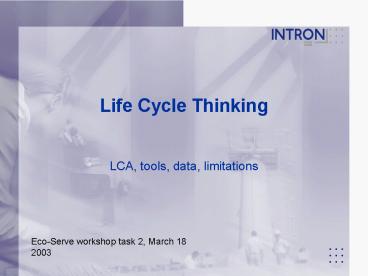Life Cycle Thinking - PowerPoint PPT Presentation
1 / 25
Title:
Life Cycle Thinking
Description:
Data collection. Step 3: Impact assessment. Calculation indicators. Step 4: Interpretation ... be covered by the FU? limestone. clinker. cement. waste. fuel ... – PowerPoint PPT presentation
Number of Views:32
Avg rating:3.0/5.0
Title: Life Cycle Thinking
1
Life Cycle Thinking
- LCA, tools, data, limitations
Eco-Serve workshop task 2, March 18 2003
2
Clusters need to know
- Which indicators represent sustainability for
their cluster topic - Which data to collect
- You will learn in the next hour
- Which indicators there are in general
- The way of thinking
3
What is sustainability?
- in the whole life cycle (cradle to gate)
4
(1) People health, safety, society
- Indicators
- Working environment
- Local impacts
- Indoor climate
- Social security
- Shelter
- Employment
- Equity
- ()
- Tools (methods)
- various
5
(2) Planet external environment
- Indicators
- Resources (raw materials, water, land)
- Global warming
- Ozone layer depletion
- Acidification
- Eutrophication
- Toxicity
- Smog
- Energy, waste,
- Risks
- Nuisance
- ()
- Tools
- Life Cycle Assessment (LCA)
- Environmental Impact Assessment
- Various others
6
(3) Profit
- Tools
- Life Cycle Costing (LCC)
- Various others
- Indicators
- Direct costs
- Indirect costs
- Competitiveness
- Productivity
- Quality
- Image
- Durability
- ()
7
Analysis of the whole life cycle
Eco-Serve material related
8
Building
9
Benefits of integratedLife Cycle thinking
- Prevents shifts to
- Other life cycles stages, e.g.
- benefit in resource can influence recyclability
- product improvement can influence durability
- Other effects
- e.g. benefit on waste while increasing energy use
- Focuses on the most important parameters
- e.g. environmental improvement of concrete
composition by optimising the cement content
10
Example recycling systemsconcrete
- Recycling stony material
- More energy
- Less waste
- Less land use
Closed Building Cycle system LCA. A comparison
of the autonomous development and Closed Building
Cycle system situation in 2005, INTRON, January
31, 2002.
11
Steps in Life Cycle thinking
- Step 1 Goal Scope
- what to do, why, how, etc
- Step 2 Inventory
- Data collection
- Step 3 Impact assessment
- Calculation indicators
- Step 4 Interpretation
- Evaluation
- Conclusions
- Functional unit
- Products to be analysed
- Process tree
- Which data
- Indicators
12
(1) Functional unit / products
Function
B25 composition Y
B25 composition X
1 m3 of concrete type according to environmental
class () in EN-206
13
Functional units definition
- Which question must be answered?
- Which systems should be covered by the FU?
- Example
- 1 ton of cement
- 1 ton of cement and the treatment of waste type xx
limestone
waste
clinker
fuel
incinerated
cement
14
(2) Inventory
Construction
Product in function
Process tree
inputs / outputs for each process
15
Inventory parameters (example)
INPUT t clinker t fly ash etc kWh
elektricitity Nm3 gas tkm transport
OUTPUT kg CO2 kg NOx kg SO2 kg dust
etc kg waste
PRODUCT 1 ton product
16
Inventory parameters (example)
17
(3) From data to indicatorsExample LCA
18
(4) Interpretation
- Which processes contribute most?
- Which substances contribute most?
- What is the sensitivity of the conclusions?
19
CO2- emission - 74 years
20
Contribution of leaching(concrete tiles)
21
Experiences from LCAs
22
Analysis on each level fromprocess to effect to
substance
- Example concrete mixture
23
Indicators on which level?
24
Data collection
25
Steps in Eco-Serve
- Functional units are defined for each cluster
- Experience from former studies is used to
establish indicators - Life cycle data are collected by the clusters
- Indicator values are calculated and mapped































